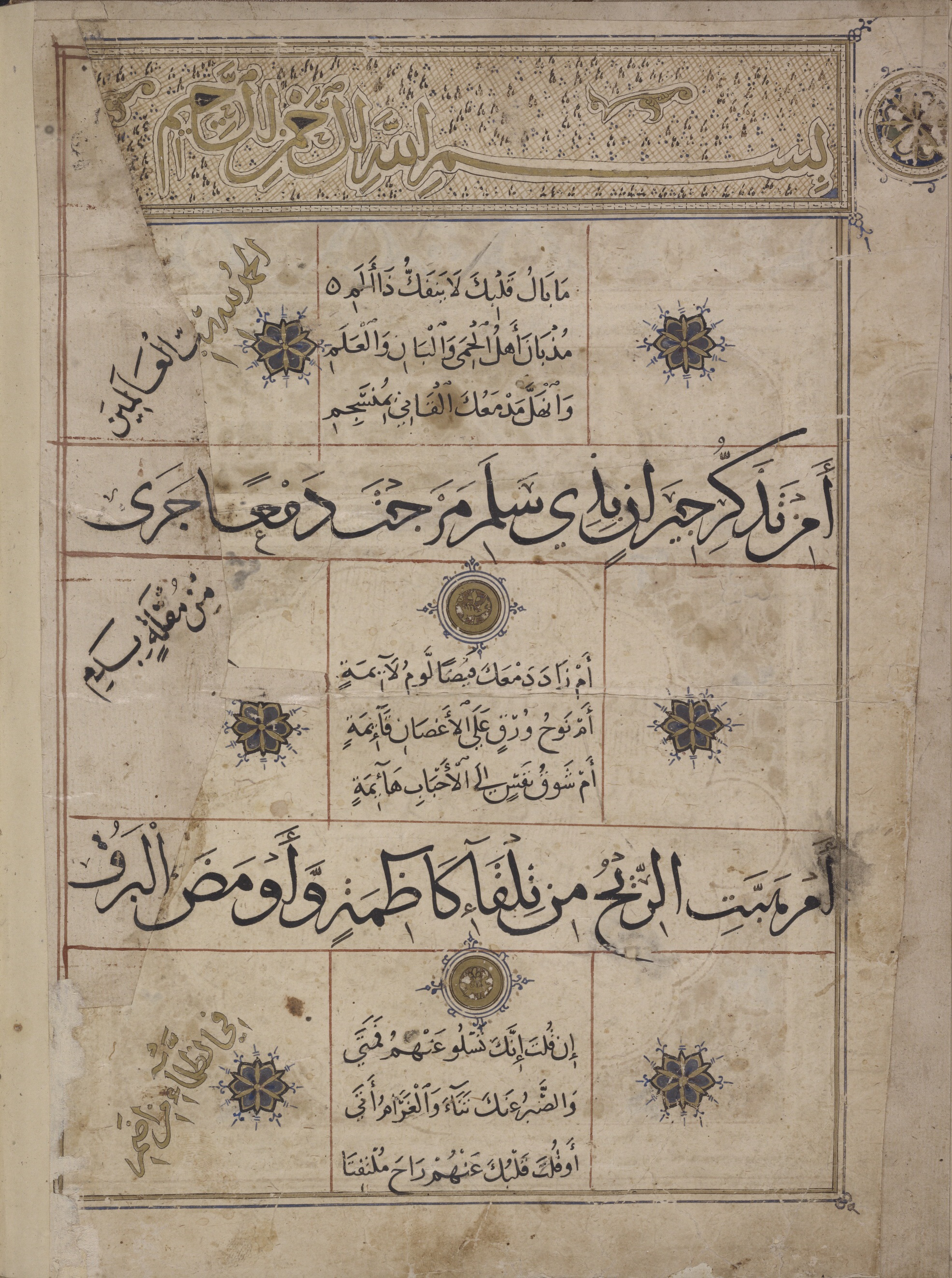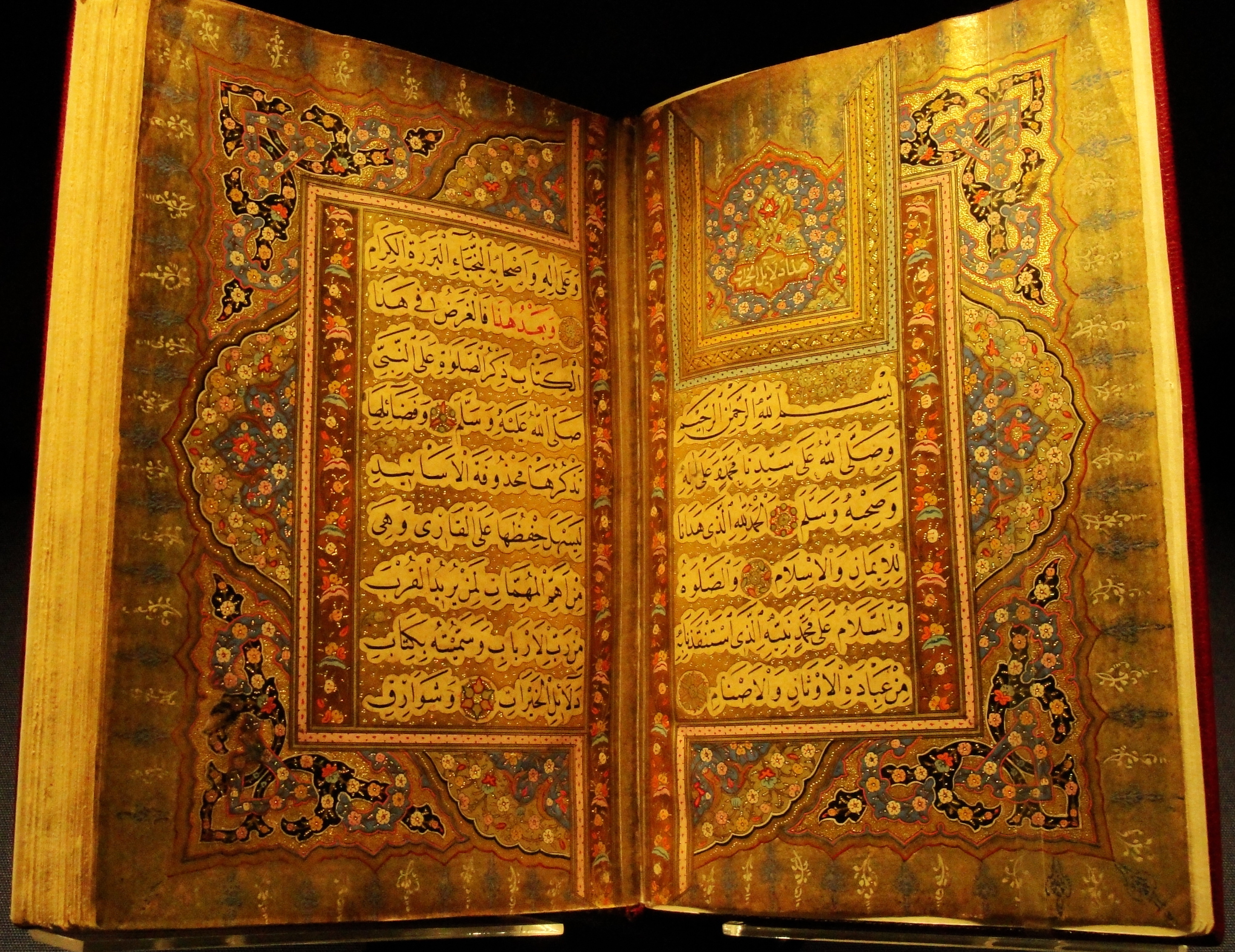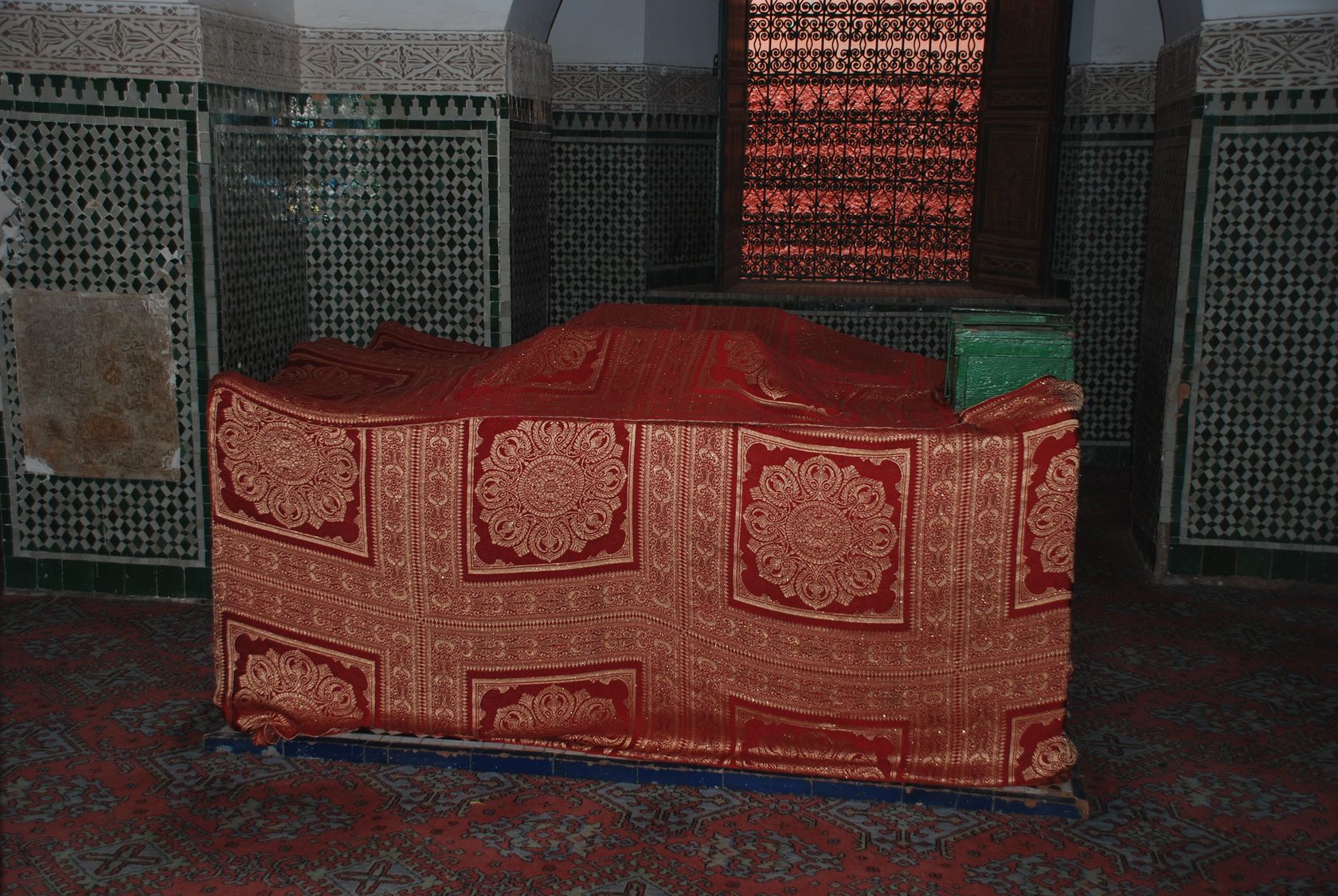|
Ash-Shifa Bi Ta'rif Huquq Al-mustafa
''Al-Shifa bi Ta'rif Huquq al-Mustafa'', ( ar, الشفا بتعريف حقوق المصطفى, ''The Remedy by the Recognition of the Rights of the Chosen One uhammad ﷺ'), of Qadi Ayyad (d. 544H / 1149CE) is perhaps the most frequently used and commented upon handbook in which Muhammad's ﷺ life, his qualities and his miracles are described in every detail. Generally known by its short title, ''ash-Shifa'' or ''al-Shifa'' (''The Healing''), this work was so highly admired throughout the Muslim world that it soon acquired a sanctity of its own, for it is said, "If ''al-Shifa'' is found in a house, this house will not suffer any harm... when a sick person reads it or it is recited to him, Allah ﷻ will restore his health." ''Ash-Shifa'' remains one of the most commentated books of Islam after the ''Sahih's'' of Muhammad al-Bukhari and Muslim ibn al-Hajjaj. Commentaries and partial explanations written on ''al-Shifa'' include: * ''Majlis fi khatmi Kitab al-Shifa' bi taʿrif hu ... [...More Info...] [...Related Items...] OR: [Wikipedia] [Google] [Baidu] |
Muhammad Tahir-ul-Qadri
Muhammad Tahir-ul-Qadri ( ur, ; born 19 February 1951) is a Pakistani–Canadian Islamic scholar and former politician who founded Minhaj-ul-Quran International and Pakistan Awami Tehreek. He was also a professor of international constitutional law at the University of the Punjab. Qadri is also the founding chairman of various sub-organisations of Minhaj-ul-Quran International. He has been included in all editions for the rankings of ''The 500 Most Influential Muslims'' since its first edition in 2009. Early years Muhammad Tahir ul Qadri was born on 19 February 1951 in the Jhang District of Pakistan. He received non-religious and Islamic Education at a young age. He is the student of Tahir Allauddin Al-Qadri Al-Gillani. He also received a First Class degree, an MA in Islamic Studies and a PhD in Islamic Law from the University of Punjab where he worked as a lecturer and then as Professor of Law. Minhaj-ul-Quran The organisation, Minhaj-ul-Quran International which ... [...More Info...] [...Related Items...] OR: [Wikipedia] [Google] [Baidu] |
Sufi Literature
Sufi literature consists of works in various languages that express and advocate the ideas of Sufism. Sufism had an important influence on medieval literature, especially poetry, that was written in Arabic, Persian, Turkic and Urdu. Sufi doctrines and organizations provided more freedom to literature than did the court poetry of the period. The Sufis borrowed elements of folklore in their literature. The works of Nizami, Nava'i, Hafez, Sam'ani and Jami were more or less related to Sufism. The verse of such Sufi poets as Sanai (died c. 1140), Attar (born c. 1119), and Rumi (died 1273) protested against oppression with an emphasis on divine justice and criticized evil rulers, religious fanaticism and the greed and hypocrisy of the orthodox Muslim clergy. The poetic forms used by these writers were similar to the folk song, parable and fairy tale. Background Sufi literature written in Persian flourished from the 12th to 15th centuries. Later major poets linked with the Sufi tra ... [...More Info...] [...Related Items...] OR: [Wikipedia] [Google] [Baidu] |
Sunni Literature
Sunni Islam () is the largest branch of Islam, followed by 85–90% of the world's Muslims. Its name comes from the word '' Sunnah'', referring to the tradition of Muhammad. The differences between Sunni and Shia Muslims arose from a disagreement over the succession to Muhammad and subsequently acquired broader political significance, as well as theological and juridical dimensions. According to Sunni traditions, Muhammad left no successor and the participants of the Saqifah event appointed Abu Bakr as the next-in-line (the first caliph). This contrasts with the Shia view, which holds that Muhammad appointed his son-in-law and cousin Ali ibn Abi Talib as his successor. The adherents of Sunni Islam are referred to in Arabic as ("the people of the Sunnah and the community") or for short. In English, its doctrines and practices are sometimes called ''Sunnism'', while adherents are known as Sunni Muslims, Sunnis, Sunnites and Ahlus Sunnah. Sunni Islam is sometimes referre ... [...More Info...] [...Related Items...] OR: [Wikipedia] [Google] [Baidu] |
Dalail Al-Khayrat
''Dalāil al-khayrāt wa-shawāriq al-anwār fī dhikr al-ṣalāt alá al-Nabī al-mukhtār'' ( ar, دلائل الخيرات وشوارق الأنوار في ذكر الصلاة على النبي المختار, translation=Waymarks of Benefits and the Brilliant Burst of Lights in the Remembrance of Blessings on the Chosen Prophet), usually shortened to ''Dala'il al-Khayrat'', is a famous collection of prayers for the Islamic prophet Muhammad, which was written by the Moroccan Shadhili scholar Muhammad al-Jazuli (died 1465 AD). It is popular in parts of the Islamic world amongst traditional Muslims—specifically North Africa, the Levant, Turkey, the Caucasus and South Asia—and is divided into sections for daily recitation. Background Moroccan ''hadith'' scholar Abdullah al-Talidi wrote of the ''Dala'il al-Khayrat'': "Millions of Muslims from East to West tried it and found its good, its blessing, and its benefit for centuries and over generations, and witnessed its unbelieva ... [...More Info...] [...Related Items...] OR: [Wikipedia] [Google] [Baidu] |
Sirah Rasul Allah
Al-Sīra al-Nabawiyya (), commonly shortened to Sīrah and translated as prophetic biography, are the traditional Muslim biographies of Muhammad from which, in addition to the Quran and Hadiths, most historical information about his life and the early period of Islam is derived. Etymology In the Arabic language the word ''sīra'' or ''sīrat'' ( ar, سيرة) comes from the verb ''sāra,'' which means to travel or to be on a journey. A person's ''sīra'' is that person's journey through life, or biography, encompassing their birth, events in their life, manners and characteristics, and their death. In modern usage it may also refer to a person's resume. It is sometimes written as "seera", "sirah" or "sirat", all meaning "life" or "journey". In Islamic literature, the plural form, ''siyar'', could also refer to the rules of war and dealing with non-Muslims. The phrase ''sīrat rasūl allāh'', or ''as-sīra al-nabawiyya'', refers to the study of the life of Muhammad. The term ... [...More Info...] [...Related Items...] OR: [Wikipedia] [Google] [Baidu] |
List Of Sunni Books
This is a list of significant books in the doctrines of Sunni Islam. A classical example of an index of Islamic books can be found in Kitāb al-Fihrist of Ibn Al-Nadim. The Qur'an and its translations (in English) :# ''The Meaning of the Glorious Koran'' by Marmaduke Pickthall :# '' The Holy Qur'an: Text, Translation and Commentary'' by Abdullah Yusuf Ali :# ''The Qur'an: A New Translation'' by Muhammad A. S. Abdel Haleem :# ''The Clear Quran: A Thematic English Translation'' by Dr. Mustafa Khattab :# ''The Holy Qur'án (The treasure of faith)'' by Professor Shah Faridul Haque :# ''Bridges' Translation of the Ten Qira'at of the Noble Qur'an'' by Fadel Soliman Hadith Six Canonical Books of Hadith Collection :# ''Sahih Bukhari'' of Muhammad al-Bukhari (d. 870 A.D. / 256 AH) :# ''Sahih Muslim'' of Muslim ibn al-Hajjaj (d. 875 A.D. / 261 AH) :# '' Sunan Ibn Majah'' of Ibn Majah (d. 887 A.D. / 273 AH) :# '' Sunan Abu Dawud'' of Abu Dawood (d. 889 A.D. / 275 AH) :# ''Jami` at-Tirm ... [...More Info...] [...Related Items...] OR: [Wikipedia] [Google] [Baidu] |
Turkish Language
Turkish ( , ), also referred to as Turkish of Turkey (''Türkiye Türkçesi''), is the most widely spoken of the Turkic languages, with around 80 to 90 million speakers. It is the national language of Turkey and Northern Cyprus. Significant smaller groups of Turkish speakers also exist in Iraq, Syria, Germany, Austria, Bulgaria, North Macedonia, Greece, the Caucasus, and other parts of Europe and Central Asia. Cyprus has requested the European Union to add Turkish as an official language, even though Turkey is not a member state. Turkish is the 13th most spoken language in the world. To the west, the influence of Ottoman Turkish—the variety of the Turkish language that was used as the administrative and literary language of the Ottoman Empire—spread as the Ottoman Empire expanded. In 1928, as one of Atatürk's Reforms in the early years of the Republic of Turkey, the Ottoman Turkish alphabet was replaced with a Latin alphabet. The distinctive characteristics of the Turk ... [...More Info...] [...Related Items...] OR: [Wikipedia] [Google] [Baidu] |
Al-Suyuti
Jalal al-Din al-Suyuti ( ar, جلال الدين السيوطي, Jalāl al-Dīn al-Suyūṭī) ( 1445–1505 CE),; (Brill 2nd) or Al-Suyuti, was an Arab Egyptian polymath, Islamic scholar, historian, Sufi, and jurist. From a family of Persian origin, he was described as one of the most prolific writers of the Middle Ages. His biographical dictionary ''Bughyat al-Wuʻāh fī Ṭabaqāt al-Lughawīyīn wa-al-Nuḥāh'' contains valuable accounts of prominent figures in the early development of Arabic philology. He was appointed to a chair in the mosque of Baybars in Cairo in 1486, and was an authority of the Shafi'i school of thought (''madhhab''). Biography Al-Suyuti was born on 3 October 1445 AD (1 Rajab 849 AH) in Cairo, Egypt. He hailed from a Persian family on his paternal side. His mother was Circassian. According to al-Suyuti his ancestors came from al-Khudayriyya in Baghdad. His family moved to Asyut in Mamluk Egypt, hence the ''nisba'' "Al-Suyuti". His father taught Sha ... [...More Info...] [...Related Items...] OR: [Wikipedia] [Google] [Baidu] |
Qadi Ayyad
ʿIyāḍ ibn Mūsā (1083–1149) ( ar, القاضي عياض بن موسى, formally Abū al-Faḍl ʿIyāḍ ibn Mūsā ibn ʿIyāḍ ibn ʿAmr ibn Mūsā ibn ʿIyāḍ ibn Muḥammad ibn ʿAbd Allāh ibn Mūsā ibn ʿIyāḍ al-Yaḥṣubī al-Sabtī ar, أبو الفضل عياض بن موسى بن عياض بن عمرو بن موسى بن عياض بن محمد بن عبد الله بن موسى بن عياض اليحصبي السبتي), born in Ceuta, then belonging to the Almoravid dynasty, was the scholar of Maliki fiqh and great imam of that city and, later, a qadi in the Emirate of Granada. Biography Iyaḍ was born into an established family of Arab origin in Ceuta. As a scion of a notable scholarly family, ʿIyad was able to learn from the best teachers Ceuta had to offer. The judge Abu ʿAbd Allah Muhammad b. ʿIsa (d. 1111) was ʿIyad’s first important teacher and is credited with his basic academic formation. Growing up, ʿIyad benefited from the traffic of sc ... [...More Info...] [...Related Items...] OR: [Wikipedia] [Google] [Baidu] |
Ali Al-Qari
Nur ad-Din Abu al-Hasan Ali ibn Sultan Muhammad al-Hirawi al-Qari ( ar, نور الدين أبو الحسن علي بن سلطان محمد الهروي القاري; d. 1605/1606), known as Mulla Ali al-Qari () was an Islamic scholar. He was born in Herat, where he received his basic Islamic education. Thereafter, he travelled to Mecca and studied under the scholar Shaykh Ahmad Ibn Hajar al-Haytami Makki, and al-Qari eventually decided to remain in Mecca where he taught, died and was buried. He is considered in Hanafi circles to be one of the masters of hadith and imams of fiqh, Qur'anic commentary, language, history and tasawwuf. He was a hafiz (memoriser of the Quran) and a famous calligrapher who wrote a Quran by hand every year. Al-Qari wrote several books, including the commentary ''al-Mirqat'' on ''Mishkat al-Masabih'' in several volumes, a two-volume commentary on Qadi Ayyad's '' Ash-Shifa'', a commentary on the '' Shama'il al-Tirmidhi'', and a two-volume commentary ... [...More Info...] [...Related Items...] OR: [Wikipedia] [Google] [Baidu] |









